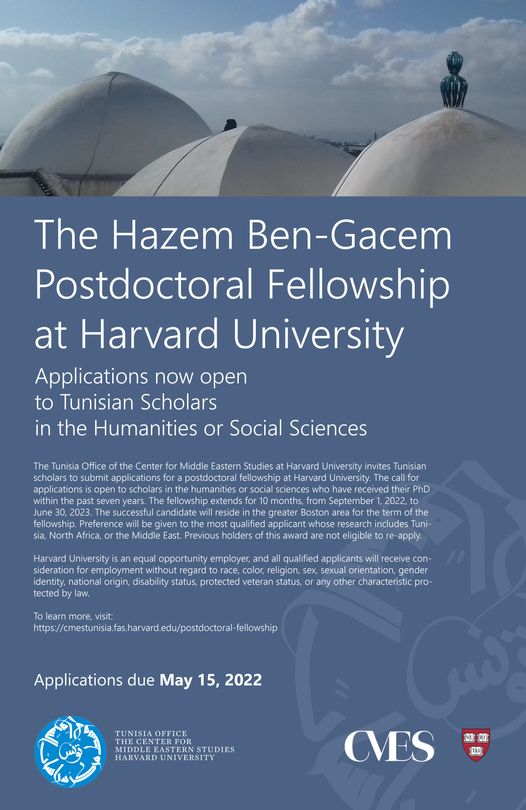The Tunisia Office of the Center for Middle Eastern Studies at Harvard University invites Tunisian scholars to submit applications for a postdoctoral fellowship at Harvard University. The call for applications is open to scholars in the humanities or social sciences who have received their PhD within the past seven years. The fellowship extends for 10 months, from September 1, 2022, to June 30, 2023. The successful candidate will reside in the greater Boston area for the term of the fellowship. Preference will be given to the most qualified applicant whose research includes Tunisia, North Africa, or the Middle East. Previous holders of this award are not eligible to re-apply.
The Hazem Ben-Gacem Postdoctoral Fellow will pursue independent research and is expected to actively engage with the scholarly community at CMES and Harvard, including attending talks, workshops, and events. The fellow will make two to three public presentations of his or her work, either at CMES or the CMES Tunisia Office.
APPLICATION MATERIALS
Applicants are required to submit the following materials, which must be received by May 15, 2022. Late applications will not be accepted:
- A current curriculum vitae, in English.
- A research proposal (statement of purpose) not to exceed 1500 words, in English.
- A writing sample not to exceed 5000 words, in English, Arabic, or French.
- A letter of recommendation written by the candidate’s dissertation advisor, in English, Arabic, or French. This letter should be submitted directly by the recommender. Please read the instructions below regarding how references should be submitted.
APPLICATION PROCEDURES
All application materials should be submitted electronically on CARAT, a Harvard platform for grants and fellowships. Applicants should carefully follow the steps described below to submit their applications:
STEP ONE (Important): All applicants need to obtain a HarvardKey from the Harvard system. The HarvardKey takes approximately one hour to activate; applicants should allow time for this activation step. Applicants can complete the application only once a HarvardKey is issued to them.
STEP TWO: Applications should be submitted exclusively on CARAT. Applicants need to use their HarvardKey to access the CARAT platform. All application materials should be uploaded as PDF files; no other file format is accepted by CARAT.
REFERENCES: All reference letters should be submitted directly by the recommender on CARAT, exclusively. Applicants can send a reference request to their recommender’s email address through the CARAT platform, while completing their application. The recommender will receive a link to upload their letter as a PDF file (no HarvardKey is required from the recommender to upload a reference letter).
Applications are due by May 15, 2022. Late or incomplete applications will be not considered. Applications that are not submitted on the CARAT platform will not be considered.
FELLOWSHIP ELIGIBILITY AND REQUIREMENTS
The following criteria must be met:
- Preference will be given to postdoctoral researchers who are residents and/or citizens of Tunisia or postdoctoral researchers who are studying topics related to Tunisia.
- Doctoral qualification should have been obtained within the past seven years in one of the following disciplines: arts, humanities, social sciences, or political sciences, with preference given to those whose credentials are from a Tunisian university.
- Priority will be given to candidates with research interests in Tunisia, North Africa, or the Middle East.
EVALUATION
Applications will be evaluated by a CMES committee based on the relevance and the quality of the research proposals and the applicants’ language proficiency. The successful applicant will be notified by June 1, 2022.
TERMS OF FELLOWSHIP
The 10-month salary for this position will range from $53,000 to $58,000 and should cover the successful applicant’s accommodation, food, and visa fees. A round-trip economy class ticket from Tunis to Boston will be issued in addition to the stipend. It is estimated that the successful applicant will spend 35 hours per week on scholarly research and academic engagement.
Harvard University is an equal opportunity employer, and all qualified applicants will receive consideration for employment without regard to race, color, religion, sex, sexual orientation, gender identity, national origin, disability status, protected veteran status, or any other characteristic protected by law.
For more information about CMES programs and opportunities, visit the CMES and CMES Tunisia websites.
For further requests, please feel free to contact the Tunisia Office of the Center for Middle Eastern Studies at Harvard University: cmes_tunisia@fas.harvard.edu
*****************************************************
By submitting their personal information, individuals consent to the processing of the information provided in their communications to CMES Tunisia and CMES at Harvard University, in compliance with the Decree 63-2004 of July 27, 2004, the Tunisian law relative to the protection of personal data. The individuals keep their right to oppose the processing of the data in question.

